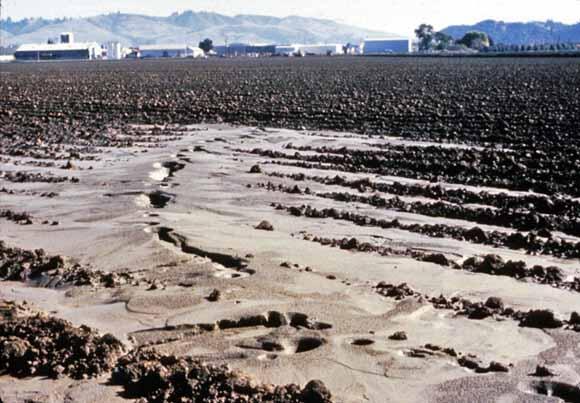EarthWord–Liquefaction
USGS EarthWord of the Week
Just as loose lips sink ships, loose soils can create this week’s EarthWord...
EarthWords is an on-going series in which we shed some light on the complicated, often difficult-to-pronounce language of science. Think of us as your terminology tour-guides, and meet us back here every week for a new word!
The EarthWord: Liquefaction
Definition:
-
Although it sounds like one side of a battle between the states of matter, liquefaction is actually something a bit more worrisome. It’s what can happen when an earthquake strikes land that is made up of loose sand and silt that is saturated with water. The intense shaking of the earthquake can actually cause the solid land to behave like a liquid.
-
When that happens, the soil can lose its ability to support structures; flow down even very gentle slopes; and erupt to the ground surface to form sand boils.
Etymology:
-
Liquefaction comes from the Latin liquefacere, which means “to make liquid” or “to melt.”
Use/Significance in the Earth Science Community:
-
Liquefaction is an important area of study in seismology, because many significant earthquake zones also have the kinds of landforms that are prone to liquefaction.
-
Scientists have determined that liquefaction requires three things to occur:
-
The land has to be made up of loose, granular sediments, such as swamps and marshlands, riverbanks and beaches, or floodplains made up of river deposits.
-
The land has to be saturated with water, such as areas with high water tables and large amounts of groundwater.
-
The earthquake has to produce strong shaking.
-
USGS Use:
-
USGS studies liquefaction hazards as part of its Earthquake Hazards Program in order to help decision-makers prepare for possible impacts from a large earthquake.
-
In particular, USGS studies liquefaction risks in California, such as the San Francisco Bay area.
-
USGS also has several liquefaction hazard maps for parts of California.
Next EarthWord: When taxonomists ask "What's your type?" they may be talking about this week's EarthWord...
Hungry for some science, but you don’t have time for a full-course research plate? Then check out USGS Science Snippets, our snack-sized science series that focuses on the fun, weird, and fascinating stories of USGS science.
Get Our News
These items are in the RSS feed format (Really Simple Syndication) based on categories such as topics, locations, and more. You can install and RSS reader browser extension, software, or use a third-party service to receive immediate news updates depending on the feed that you have added. If you click the feed links below, they may look strange because they are simply XML code. An RSS reader can easily read this code and push out a notification to you when something new is posted to our site.


